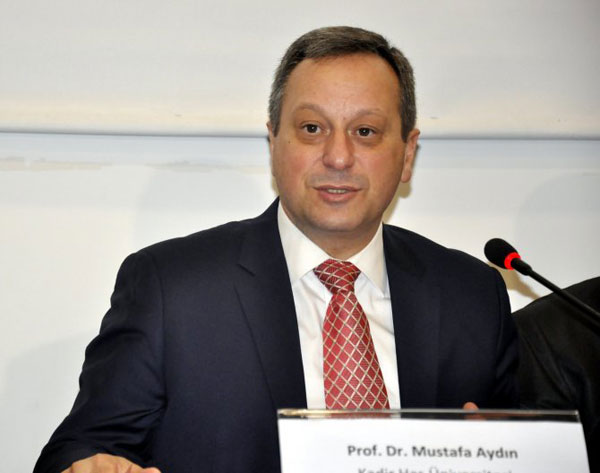By the characterization of Rector of Kadir Has University in Istanbul, Mustafa Aydin, the issue of the relations with Armenia is not a priority in Turkey.
– Mr. Aydin, first of all, how do you assess the “Normalization of Relations between Armenia and Turkey: Challenges and Perspectives” program which is conducted by the “Civil Consent” NGO in support of the British Ministry of Foreign Affairs, and the purpose of your visit to Armenia this weekend is to take part in this program? Is there an interest in Turkey in similar programs? Are the youth in Turkey interested in the theme of Armenia-Turkey relations in general?
– I think these kinds of projects are very important because people had to get the knowledge of each other. When people do not know each other and do not have personal experience with each other, then they start thinking in kind of conspiracy. In this case, they are also easy to mislead and they start believing in stories that do not exist. So, this kind of projects, I think, are very important and we need to have much more of them. Only among the youngsters in Turkey, there is an interest in Armenia, I would not say that, for example, anybody in the street, the Turkish youngsters would start, they would not push to learn about Armenia by themselves but if you present them in a program like this, then there is an opportunity that they would come and join it. For example, at my University, there are a number of language courses and one of them is Armenian. There was no demand, nobody demanded it, but when we opened it, it is always full. So, there is an interest.
– Soon, Turkey is going to have constitutional amendments, and there is a widespread opinion that when Erdoğan expands the powers of a president, he as an unpredictable figure in foreign policy matters may undertake some moves in the direction of normalization of Armenia-Turkey relations too. Not in the direction of the establishment of diplomatic relations but in terms of contacts in other spheres. Can we anticipate similar developments from Turkey in the direction of Armenia-Turkey relations in future?
Read also
– I think that the discussion in Armenia is not related to the reality in Turkey. Armenia is not in the list of Turkey’s discussions and not in the list of Erdoğan’s priorities and thinking. And I don’t think that he would by himself or the government he creates would start this discussion. The relations with Armenia are not in his priority if it comes from Armenia some idea, then I think he might think. Your know, the last time when we had a dialogue and the protocols, that were an initiative that came from the Foreign Ministry and it was a kind of related to Turkey’s reform to become part of the European Union. So, now there is no European connection and also the policy-making moves from the Foreign Ministry to Presidential palace. So, in this kind of environment, this will not be a priority in the next couple of years.
– The issue of Turkey-Azerbaijan relations is also discussed a lot, and there is also an opinion in Armenia that Turkey’s dependence affected not only the process of normalization of Armenia-Turkey relations but generally, an impression is created that Turkey is connected to Azerbaijan with many ties in numerous spheres. I do not want to say that Turkey has become a hostage to Azerbaijan but do these connections somehow affect the Turkish policy? Are these notions true?
– Yes, there is a connection between Azerbaijan and Turkey that affects Turkish relationship with Armenia. I would not say, I know the perception of Armenia that people are thinking that it is Azerbaijan that is dominating this relationship and connected to Turkey. But this is not that easy. Armenia’s view is very distinct. I think the analysis in Turkey is much more complex and the relationship has different levels. So, Turkish-Azerbaijani relationship is a strategic relationship. It benefits Azerbaijan, but it also benefits Turkey quite much. The first is the oil connection, the pipelines that are very important for Turkey. Second is, of course, the trade and investments in Turkey that are also important. And the third, having an influence on the Caucasus which is also important to Turkey. So, if you are looking on this in the map, Azerbaijan and Georgia become very important for Turkey to have connections in the Caucasus. So if improving Turkey’s relations with Armenia would hurt this connection then why should Turkey do it. So it is more strategic thinking than anything was.
– Is the tension in Russian-Turkish relations in the past, or there are still discrepancies, particularly, for example, on Syria and Assad’s destiny? How can the warming of Russian-Turkish relations influence on our region?
– Of course, Russia has become a quite influential country not only in Caucasus and the Black Sea but also in the Middle East. So Turkey is taking that consideration too. The relationship is getting slowly better now. As far as Syria is concerned, I think there is some sort of an agreement. Now, Turkey’s strategic interest in Syria is to have an area under its control and prevent a Kurdish entity there. And Turkey has also stopped its ambition to change Assad. So that is an agreement it seems: Russia allows Turkey to have a territory in Syria and influence area and Turkey does not interfere, for example, their helping Syria in Aleppo. For the Caucasus, this kind of relationship would mean that nothing will be changing in the Caucasus. Turkey will not be challenging the Russian supremacy. And Russia would be respecting Turkish connection in Azerbaijan and Georgia unless it does not threaten Russia directly. And of course, this would mean for Armenia that Armenia would be a good friend for Russia and not very friendly to Turkey. Unfortunately.
Emma GABRIELYAN,
Aravot Daily






















































